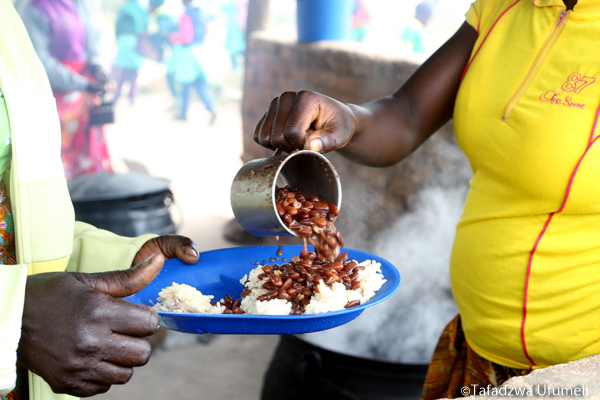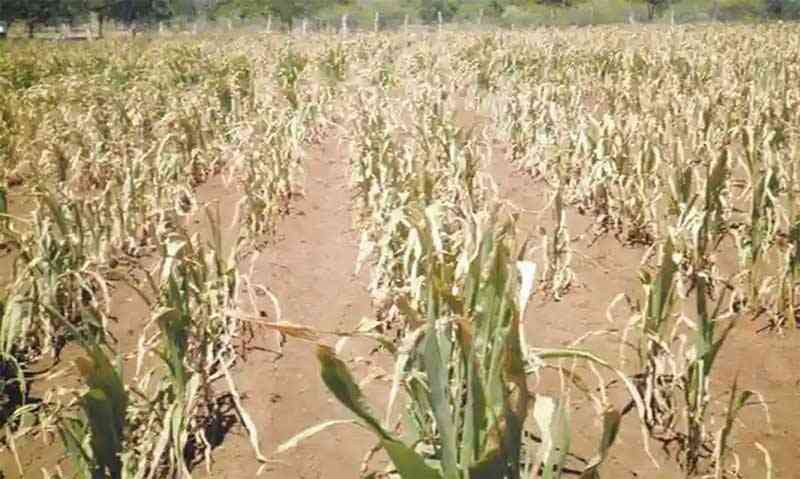
ONE of Africa’s most eminent statesmen, the late Nelson Mandela, once said education was the only tool that could change the world. But for Tariro Chipawe, a Grade 6 pupil at Gwemombe Primary School, education almost seemed like a broken tool owing to the devastating effects of climate change that have made her future look bleak.
BY TAFADZWA UFUMELI

Walking a long distance from the village to school on an empty stomach and then concentrate in class throughout the day is a herculean task for her and her friends in Zvishavane, a rural outskirt 386km from the capital, Harare.
“My mother could only provide us with a meal in the evening. This made me hate attending class. I thought I would never realise my dream of becoming a nurse,” Tariro said.
Children’s participation in school work and school attendance declined due to an El-Nino-induced drought that ravaged most parts of Zimbabwe.

The effects of hunger, according to the villagers, had become so devastating that some pupils would collapse during lessons or fall sleep due to hunger pangs and that made them miss crucial lessons.
In 2016, the World Food Programme (WFP) Zimbabwe implemented an Emergency School Feeding Programme as part of the response to alleviate effects of the El-Nino induced drought on school children.
The school feeding under the emergency response provided a safety net by giving children access to one hot meal at schools in Binga, Zvishavane and Mbire districts with more than 75 000 pupils being fed with a nutritious hot meal every day.
- Chamisa under fire over US$120K donation
- Mavhunga puts DeMbare into Chibuku quarterfinals
- Pension funds bet on Cabora Bassa oilfields
- Councils defy govt fire tender directive
Keep Reading

Prior to programme inception, an assessment to review the schools preparedness was conducted at all schools by WFP and Ministry of Primary and Secondary Education officials. The assessments included review of water availability, cooking and storage facilities.
School authorities and communities worked towards the development of cooking facilities where these were not available, however, water challenges, noted in many schools could not be immediately addressed.
To ensure the availability of safe cooking water, WFP sought and secured funding for the construction of boreholes in schools with the most challenges. The water source development initiative was then implemented to address the immediate needs and cater for the long-term objective of a home grown school feeding programme that has a component on agriculture through school gardens for food and learning.

“My mother lost four cattle and we were told that it was because of climate change. However, shockingly sometime in July we were given some porridge at school and this revived my willingness to attend school,” Tariro said.
Gwemombe headmaster, Emmanuel Shoko, said the initiative was timely as it was implemented at the peak of the El-Nino.
“Zvishavane district was affected more by drought and to control the attendance of my students when they are hungry is hard and pass rate usually suffers during droughts but thanks to the government and WFP initiative,” he said.
Home grown school meals programme typically involve the education, health and agricultural sectors, requiring significant coordination, hence they can only be successful when there is clear commitment and government ownership.
Zimbabwe World Food Programme country director Eddie Rowe said he was impressed with the progress made since the programme was initiated in October last year.

“Currently there are six boreholes functioning, pupils, communities accessing water and vegetable gardens are developing, we believe if we can focus in Zvishavane, and put the infrastructure in place, then the soft activities which are providing and preparing food, those would come in easily to ensure that this activity of providing at least a meal in the schools is not a dream but a reality,” he said.
The communities around Gwemombe Primary School are also benefiting from the programme and all actors along the value chain are deeply involved in order to increase programme sustainability.
With community engagement, especially when it was combined with training it has allowed beneficiaries to cultivate skills that can extend to other spheres of their lives and strengthen their livelihoods.
Pepukai Chimuka, a mother of two children benefiting from the school feeding initiative, said she was happy with the intervention which has halted hunger in its tracks.

“The school feeding program is now running throughout the year at Gwemombe Primary School,” she said.
The WFP has drilled 11 boreholes to ensure access to water which will also enable parents and school pupils to do sustainable gardening projects.
According to Primary and Secondary Education minister Lazarus Dokora said government was prioritizing access to safe and clean water in schools to ensure the success of the feeding programme.

“We took a decision in the last quarter of last year to look at the particular schools which were facing challenges of water in the Zvishavane district,” Dokora said in an interview.
With access to safe and clean water sources, Tariro dream of becoming a nurse is within reach.











